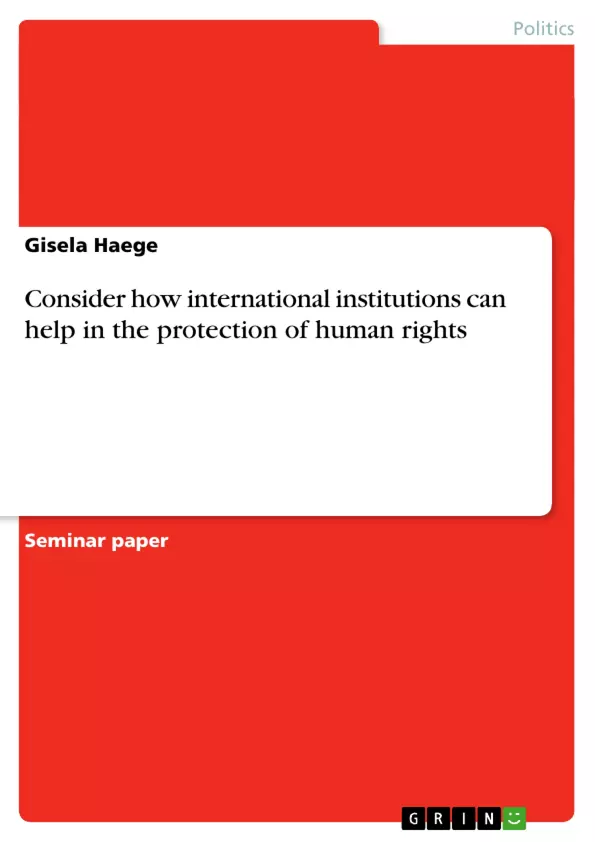Human rights are rights to which all human beings are equally entitled, independently of acts of law. The foundation of this entitlement is human dignity.
Human rights are not only to be respected by public authorities (vertical dimension of human rights), but also by private parties (horizontal dimension of human rights) as human rights law increasingly admits. The latter dimension is to be implemented first of all by the national criminal law.
Human rights law distinguishes two sets of human rights: first, civil rights (for example the right to life and physical integrity) and political rights (for example the right to participate in politics) and second, social rights (for example the rights of children, women, ethnic groups and the right to social security), economic rights (for example those referring to labour conditions, health and safety at the workplace) and cultural human rights. The realisation of both sets of rights depends on each other. Extreme poverty or illiteracy, for example, makes the exercise of civil and political rights difficult. That it is more expensive to realise social and economic than civil and political human rights, cannot be upheld generally, because mechanisms to monitor and enforce the respect of human rights are needed. Press gives some examples on this. Better working conditions, more occupational safety and social security are examples for costly economic rights.
Inhaltsverzeichnis (Table of Contents)
- Definition of human rights
- Aspects of protection of human rights
- Legitimisation of the UN intervening in human rights matters
- Links between human rights and the other activities of the UN
- Ambivalence of member states and thus the UN facing human rights
- Prevention
- Standard-setting
- Promotion
- Changes in national law
- Monitoring
- Assistance, training and technical cooperation
- Institution building
- Implementation
- Justice done to the victims of human rights violations
- Redress of damage done to the victims of violations of human rights
- Protection of victims from further damage
- Impact of human rights law
Zielsetzung und Themenschwerpunkte (Objectives and Key Themes)
This essay examines the role of the United Nations (UN) in the protection of human rights. It starts by defining human rights and outlining the different aspects of their protection. The essay then analyzes the legitimacy of the UN's intervention in human rights matters, exploring the links between human rights and other UN activities. Finally, it considers the impact of the UN's human rights activities and draws conclusions on the effectiveness of its efforts.
- Defining human rights and their scope
- Examining the different aspects of human rights protection
- Analyzing the UN's role in promoting and enforcing human rights
- Exploring the challenges and complexities of human rights protection
- Evaluating the impact of UN human rights activities
Zusammenfassung der Kapitel (Chapter Summaries)
The essay begins by defining human rights, emphasizing their universal applicability and their foundation in human dignity. It explains the distinction between civil, political, social, economic, and cultural human rights, highlighting the interdependence between these categories. The essay then discusses the various aspects of human rights protection, including prevention, investigation, conviction, remedy, and protection of victims.
Next, the essay examines the legitimacy of the UN's intervention in human rights matters, drawing upon international law and the UN Charter. It argues that the UN's role in human rights protection is justified by the obligation of member states to respect human rights, which is enshrined in the UN Charter. The essay then explores the links between human rights and other UN activities, including peacekeeping, peace-building, and development cooperation.
Finally, the essay addresses the challenges faced by the UN in protecting human rights, highlighting the ambivalences of member states and their willingness to compromise on human rights issues. It also discusses the potential impact of UN human rights activities, acknowledging the complexities and limitations of international intervention.
Schlüsselwörter (Keywords)
The essay focuses on key concepts like human rights, human rights protection, the United Nations, international law, human rights violations, prevention, implementation, member states, and international intervention. It explores the various aspects of human rights protection, including standard-setting, promotion, monitoring, assistance, justice, redress, and protection of victims. The essay also examines the relationship between human rights and other UN activities, such as peacekeeping, peace-building, and development cooperation.
Frequently Asked Questions
What is the foundation of human rights?
The foundation of human rights is human dignity, entitling all human beings equally regardless of specific acts of law.
What is the difference between vertical and horizontal dimensions of human rights?
The vertical dimension refers to protection against public authorities, while the horizontal dimension involves protection against private parties, often implemented through national criminal law.
How does the UN justify intervening in human rights matters?
The UN's role is justified by the obligation of member states to respect human rights as enshrined in the UN Charter and international law.
What are the different categories of human rights?
Human rights are categorized into civil and political rights (like the right to life) and social, economic, and cultural rights (like social security or labor conditions).
What challenges does the UN face in human rights protection?
Key challenges include the ambivalence of member states, limited willingness to compromise, and the complexity of international intervention.
- Citation du texte
- Gisela Haege (Auteur), 2002, Consider how international institutions can help in the protection of human rights, Munich, GRIN Verlag, https://www.grin.com/document/16114



